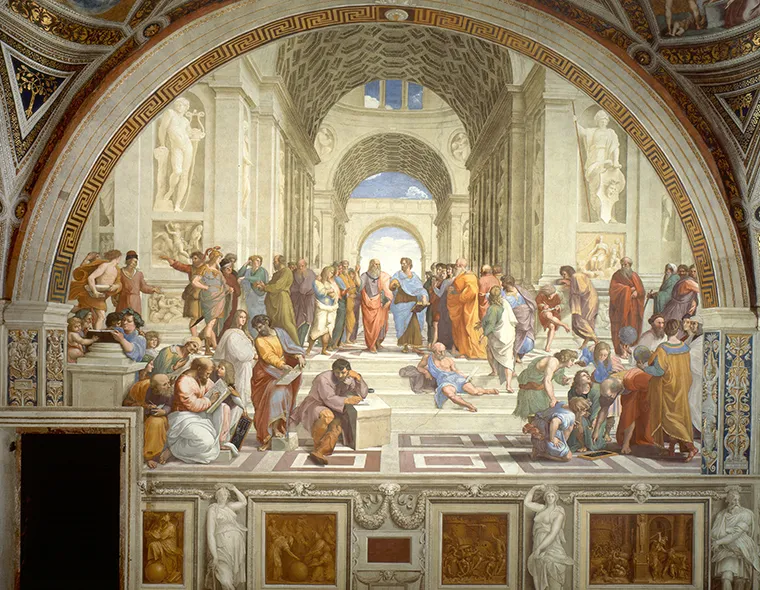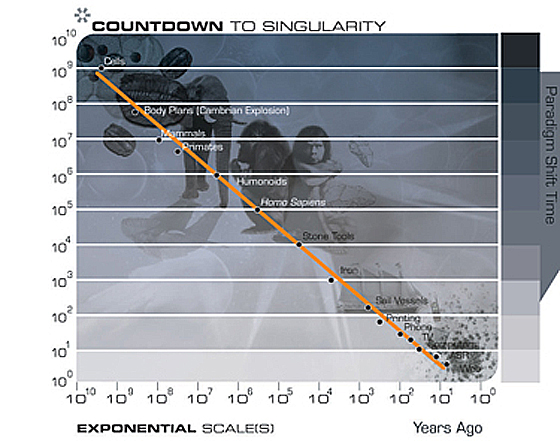A New Renaissance: Crisis (危機) = Danger (危) + Opportunity (機)
by Lifeboat Foundation Advisory Board member José Luis Cordeiro, MBA, Ph.D.

The School of Athens is a fresco by the Italian Renaissance artist Raphael. It was painted between 1509 and 1511 as a part of Raphael’s commission to decorate the rooms now known as the Stanze di Raffaello, in the Apostolic Palace in the Vatican. The Stanza della Segnatura was the first of the rooms to be decorated, and The School of Athens, representing philosophy, was probably the third painting to be finished there, after La Disputa (Theology) on the opposite wall, and the Parnassus (Literature). The picture has long been seen as “Raphael’s masterpiece and the perfect embodiment of the classical spirit of the Renaissance”. The painting is notable for its accurate perspective projection.
A crisis is a terrible thing to waste!
Paul Romer, Nobel Prize Laureate in Economics
Overview
The Chinese word for crisis has two characters (危機). The first character (危) represents danger and the second character (機) can be interpreted as opportunity, change of time, moment, or chance. Even though the meaning of the characters can vary according to the context and nearby characters, the understanding of crisis (危機) as danger (危) plus opportunity (機) can help us to analyze the present situation of our planet. (Some Western "Chinologists" might argue the real meaning of such Chinese characters, but most Chinese people, and also Japanese and Koreans, would agree with the general idea that a crisis represents danger plus opportunity.)
We are currently living in a historical crisis, which implies present danger but also a future opportunity. Even though the Covid-19 originated in China, it is now a global problem and it requires a global solution. This unexpected crisis can be a fantastic opportunity to move forward together as one global family in our small planet, if we avoid the danger of standing divided against our common enemy.
Covid-19 probably represents the worst pandemic in about a century, since the 1918–1920 “Spanish flu”, when it is estimated that up to 100 million people died, which was substantially more than the casualties in World War I, or even in World War II. Now, fortunately, thanks to the exponential advances of science and technology, we might be able to stop it soon together, and avoiding even having one million deaths, in a population much larger than in previous tragedies.
In this great planetary war against the little new coronavirus, including its possible mutations, many public and private responses are emerging. Governments, large companies, small startups, universities, and even individuals are trying to figure out how to control, cure, and eliminate Covid-19, along with its present and future mutations. The costs will be high at the start, but they will be quickly amortized by massifying the best treatments all over the planet.
As another historical reference, let’s remember that when HIV and AIDS appeared, it took more than two years to sequence the virus, and there were no treatments for several more years. AIDS was even considered the perfect disease because it destroyed the immune system itself and thus basically constituted a death sentence, with no possible escape. After years, the first treatments to control HIV were developed, and each treatment cost millions of dollars. Today, however, HIV is treated as a chronic disease with antivirals costing hundreds of dollars in richer countries, and only tens of dollars in poorer countries like India. Fortunately, it is also highly likely that in this decade a vaccine will finally be discovered to cure and definitively eliminate HIV.
Exponential Technologies

Figure is from our special report Law of Accelerating Returns.
Although it seems difficult to believe in these times of crisis, thanks to the great exponential advances in science and technology, I hope that there will be some antivirals in a few weeks and the first vaccines against this virus in a few months. It is quite possible that the terrible pandemic of the Covid-19 will be remembered in the future for having been overcome with unprecedented speed.
Covid-19 is becoming a great lesson for humankind. It has shown that we must work together because global problems require global solutions. This experience will eventually serve as a learning lesson for other global challenges such as climate change or terrorism, for example. There will be new pandemics in the future, but we will be more prepared to overcome them quickly thanks to exponential technologies.
It is highly likely that we will sequence the next pandemic virus in just two days, and the next one after maybe in two hours, and not in two weeks like it was for Covid-19 now, or two months for SARS two decades ago, or more than two years for AIDS four decades ago. Not only the times for fighting these diseases are being reduced exponentially, but also the costs are falling drastically. The world will be better prepared for new pandemics and new global challenges such as climate change, wars, terrorism, earthquakes and tsunamis, meteorites and other space threats, among many future challenges. And hopefully this will be the last great pandemic that all of humanity will suffer!
A New Renaissance

The Black Death, also known as the Pestilence and the Plague, was the most fatal pandemic recorded in human history, resulting in the deaths of up to 200 million people all across the old continent and peaking in Europe from 1347 to 1351. The Renaissance started in Italy partly as a response to such an incredible disaster. In Florence, Giovanni Boccaccio wrote “The Decameron” (sometimes nicknamed “The Human Comedy”) in the late 1340s and early 1350s depicting a group of 10 friends who self-isolated during the Black Death and composed 10 stories going from the tragic to the sublime. Boccaccio was somehow following the steps of the great masterpiece “Comedia” written in 1320 by Dante Alighieri, and Boccaccio was the person who added the “divine” term to the now known “Divine Comedy”.
The Great Plague of London from 1665 to 1666 was the last major epidemic of bubonic plague to occur in England. It killed an estimated quarter of the population of London and was followed by the Great Fire of London that lasted five days and the fire destroyed the medieval City of London inside the old Roman city walls. However, such an incredible human tragedy was the opportunity to rebuild London, its Cathedral, the Royal Observatory, and Royal Society, among many other landmarks. During his Cambridge isolation of the Great Plague, Sir Isaac Newton developed his theories on calculus, optics, and the law of gravitation. Similarly, William Shakespeare wrote his “King Lear” during previous bubonic plagues in London and was also inspired for other masterpieces like “Romeo and Juliet” and Macbeth”.
Incredible Opportunities

Covid-19 is the global danger that uncovers a great opportunity in the middle of this planetary crisis. The 2020s might not be like the Roaring 1920s, but this will certainly be a decade full of incredible opportunities for all of humanity. This will be the decade when the first humans land on planet Mars, according to Elon Musk, when artificial intelligence passes the Alan Turing Test and reaches human intelligence levels, according to Ray Kurzweil, and when longevity escape velocity and radical life extension might finally be achieved, according to Aubrey de Grey. And the year 2030, according to the World Bank, could be the time when we eliminate poverty in the world, for the first time in history, and we reach the Sustainable Development Goals.
Technology is what differentiates humans from other animals, and exponential technologies are our great ally to accelerate positive changes. Technology makes humans to be more humans, and thanks to technology we keep moving up the pyramid of hierarchy needs according to Abraham Maslow. In the next 10 years we are going to see more technological changes than in the last 100 years. Indeed, more advances in the following decade than in the previous century. Let’s not waste this crisis and together let’s move forwards and upwards to a better world for all.
Arthur C. Clarke
José Luis Cordeiro and Arthur C. Clarke
I had the great opportunity to meet in person and to publish the last public interview with the great engineer, science fiction author and visionary Sir Arthur C. Clarke. With his remarkable British humor, he told me that we always have to remain positive about the future, and continuously try to change bad dangers into good opportunities. He explained to me that the future begins with the visions that we create in our own minds, and that is why we must be positive, and always look at the glass half full and not half empty.
This is the greatest time in human history, nothing compares to the possibilities in front of us, but we still have seen nothing yet. The future is just beginning, as Clarke described in his Three Laws of the Future:
- When a distinguished but elderly scientist states that something is possible, he is almost certainly right. When he states that something is impossible, he is very probably wrong.
- The only way of discovering the limits of the possible is to venture a little way past them into the impossible.
- Any sufficiently advanced technology is indistinguishable from magic.